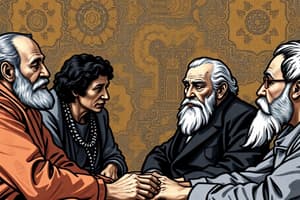Podcast
Questions and Answers
Karl Marx's theories focus on class ______ and its role in social evolution.
Karl Marx's theories focus on class ______ and its role in social evolution.
conflict
Dorothy Smith argues that women are alienated from their ______.
Dorothy Smith argues that women are alienated from their ______.
experiences
In anthropology, cultural anthropology examines contemporary ______.
In anthropology, cultural anthropology examines contemporary ______.
societies
Psychoanalysis unlocks the unconscious mind, which is key to understanding human ______.
Psychoanalysis unlocks the unconscious mind, which is key to understanding human ______.
Behaviourism focuses on understanding and changing human behaviour through ______.
Behaviourism focuses on understanding and changing human behaviour through ______.
Australopithecus is a genus of early hominids that existed in Africa during the Pliocene and Early ______.
Australopithecus is a genus of early hominids that existed in Africa during the Pliocene and Early ______.
Homo Habilis is often referred to as the ______ due to its use of tools.
Homo Habilis is often referred to as the ______ due to its use of tools.
The study of behavior, biology, evolution, and taxonomy of nonhuman primates is known as ______.
The study of behavior, biology, evolution, and taxonomy of nonhuman primates is known as ______.
Ethnology involves the study and comparison of past and contemporary ______.
Ethnology involves the study and comparison of past and contemporary ______.
A ______ of Passage is a ceremonial event that marks the transition from one social or religious status to another.
A ______ of Passage is a ceremonial event that marks the transition from one social or religious status to another.
Cultural ______ is the belief that one’s own culture is superior to others.
Cultural ______ is the belief that one’s own culture is superior to others.
The ______ Theory suggests that every belief in a culture serves to meet the needs of individuals within that culture.
The ______ Theory suggests that every belief in a culture serves to meet the needs of individuals within that culture.
The Edith Experiment was created by ______ to see if the right environment could create a genius.
The Edith Experiment was created by ______ to see if the right environment could create a genius.
Oxana Malaya was a Feral child who was raised by ______.
Oxana Malaya was a Feral child who was raised by ______.
Genie Wiley is an example of an Isolate child demonstrating the negative impacts of having no or negative agents of ______.
Genie Wiley is an example of an Isolate child demonstrating the negative impacts of having no or negative agents of ______.
The Stanford prison experiment raised ethical concerns regarding the treatment of ______.
The Stanford prison experiment raised ethical concerns regarding the treatment of ______.
The Theory of Evolution studies human biology, particularly the origins, diversity, and adaptations of modern ______.
The Theory of Evolution studies human biology, particularly the origins, diversity, and adaptations of modern ______.
According to Charles Darwin, individual variations can be ______ among any population.
According to Charles Darwin, individual variations can be ______ among any population.
It is designed to weaken or eliminate a behaviour rather than increase it: ______
It is designed to weaken or eliminate a behaviour rather than increase it: ______
Populations produce more offspring than the environment can ______, yet populations remain stable.
Populations produce more offspring than the environment can ______, yet populations remain stable.
Natural Selection is influenced by environmental factors that determine how well particular traits serve in ______ and reproduction.
Natural Selection is influenced by environmental factors that determine how well particular traits serve in ______ and reproduction.
A learned response to a previously neutral stimulus is called a ______
A learned response to a previously neutral stimulus is called a ______
A stimulus that does not require any conditioning for desired behaviour is known as a ______
A stimulus that does not require any conditioning for desired behaviour is known as a ______
The passing on of 'favourable variations' leads to gradual population ______.
The passing on of 'favourable variations' leads to gradual population ______.
Something that naturally triggers an automatic response is referred to as an ______
Something that naturally triggers an automatic response is referred to as an ______
The tendency to give similar conditioned responses to both the conditioned stimulus and other resembling stimuli is called ______
The tendency to give similar conditioned responses to both the conditioned stimulus and other resembling stimuli is called ______
Cognitive psychology studies how the brain learns best and considers mental states such as beliefs, motivations, and ______
Cognitive psychology studies how the brain learns best and considers mental states such as beliefs, motivations, and ______
Learning that occurs by observing behaviour and its consequences is associated with ______ learning theory
Learning that occurs by observing behaviour and its consequences is associated with ______ learning theory
In the Bobo the Clown Experiment, children who saw adults rewarded for aggressive behaviour imitated ______
In the Bobo the Clown Experiment, children who saw adults rewarded for aggressive behaviour imitated ______
The interaction of cognition, behaviour, and environment is described by the concept of ______ determinism
The interaction of cognition, behaviour, and environment is described by the concept of ______ determinism
Flashcards
Conflict Theory (Marx)
Conflict Theory (Marx)
A sociological theory that suggests competition for power and wealth drives social change, with the wealthy class hindering the poor's economic advancement.
Feminist Sociology (Smith)
Feminist Sociology (Smith)
A theory arguing that women's experiences are often undervalued or ignored, leading to alienation from their own lives.
Symbolic Interactionism (Weber)
Symbolic Interactionism (Weber)
A perspective that focuses on how individuals interpret and interact with the world through symbols and meanings, emphasizing social interactions.
Physical Anthropology
Physical Anthropology
Signup and view all the flashcards
Cultural Anthropology
Cultural Anthropology
Signup and view all the flashcards
Australopithecus
Australopithecus
Signup and view all the flashcards
Australopithecus Boisei
Australopithecus Boisei
Signup and view all the flashcards
Homo Habilis
Homo Habilis
Signup and view all the flashcards
Homo Ergaster
Homo Ergaster
Signup and view all the flashcards
Homo Erectus
Homo Erectus
Signup and view all the flashcards
Homo Heidelbergensis
Homo Heidelbergensis
Signup and view all the flashcards
Primatology
Primatology
Signup and view all the flashcards
Extinction
Extinction
Signup and view all the flashcards
Conditioned Stimulus
Conditioned Stimulus
Signup and view all the flashcards
Conditioned Response
Conditioned Response
Signup and view all the flashcards
Neutral Stimulus
Neutral Stimulus
Signup and view all the flashcards
Unconditioned Stimulus
Unconditioned Stimulus
Signup and view all the flashcards
Unconditioned Response
Unconditioned Response
Signup and view all the flashcards
Stimulus Generalization
Stimulus Generalization
Signup and view all the flashcards
Cognitive Psychology
Cognitive Psychology
Signup and view all the flashcards
Social learning theory
Social learning theory
Signup and view all the flashcards
Theory of Evolution
Theory of Evolution
Signup and view all the flashcards
Natural Selection
Natural Selection
Signup and view all the flashcards
Isolate Child
Isolate Child
Signup and view all the flashcards
Feral Child
Feral Child
Signup and view all the flashcards
Socialization
Socialization
Signup and view all the flashcards
Sociology
Sociology
Signup and view all the flashcards
Stanford Prison Experiment
Stanford Prison Experiment
Signup and view all the flashcards
The Edith Experiment
The Edith Experiment
Signup and view all the flashcards
Anthropology
Anthropology
Signup and view all the flashcards
Study Notes
Main Theorists and Discoveries
- Anthropology Theorists:
- Margaret Mead (cultural)
- Dian Fossey (Primatology)
- Jane Goodall (Primatology)
- Donald Johanson (Paleoanthropology)
- Charles Darwin (Paleoanthropology)
- Raymond Dart (Paleoanthropology)
- Psychology Theorists:
- Ivan Pavlov (Classical Conditioning, Behaviourism): Investigated salivation in dogs, noticing salivation in response to the researcher's presence alone, not just food.
- B.F. Skinner (Operant Conditioning, Behaviourism): Studied observable behaviours, using rats and pigeons to demonstrate how rewards and punishments influence behavior.
- Sigmund Freud (Psychoanalysis): Believed unintentional errors (Freudian slips) revealed subconscious feelings and that early childhood experiences influence the unconscious mind.
- Karen Horney (Psychoanalysis): A Neo-Freudian who modified Freud's theory, emphasizing social and cultural aspects of personality.
Additional Information
- Sigmund Freud's perspective: All human behavior is influenced by early childhood experiences.
- Freud's Freudian Slip example: Calling a new love interest by an ex's name symbolizes unresolved feelings.
- Personality: Personality is not solely influenced by conflicts in childhood; women's roles in society significantly impacted their personalities.
- Conflicts: Feeling unsafe, unloved, or undervalued in society influence the development of internal conflict.
- Carl Jung: Believed that a balance between the personal and collective unconsciouses allow humans to reach their full potential.
- The "Psyche": The unconscious mind is comprised of a personal and collective unconscious.
- Archetypes: Universal symbols that periodically reappear throughout cultures and times (models of people, behaviours, and personalities, such as mother, father).
- Jung's Analytical Psychology: People must balance their conscious and unconscious thoughts/feelings to reach their full potential.
- Erich Fromm: Modern society negatively impacts a person's psychological state.
- Abraham Maslow (Humanism): People are driven by basic psychological needs. Once met, they are driven by social needs.
- Emile Durkheim (Structural functionalism): Formally established sociology as a discipline, studying the factors that unite and drive people in society.
- Talcott Parsons (Structural functionalism): Society and its behaviors are driven by the strong desire for people to cooperate and cooperate; even though individuals pursue their own interests, there is still a strong drive to cooperate.
- Karl Marx (Conflict Theory): Society's structure and social evolution is driven by competition for power.
- Karl Rogers (Humanism): Believed in the innate goodness of people.
- Albert Bandura (Cognitive): Focuses on people's desires and motivations.
- Elizabeth Loftus (Cognitive): Focused on memory construction and how this impacts development.
Introduction to Social Sciences
-
Anthropology:
- Systematic study of humans and human cultures.
- Four subdisciplines: Cultural, Physical, Linguistics, and Archaeology.
-
Physical Anthropology: Primarily concerned with human biological origins.
-
Cultural Anthropology: Studies contemporary cultures.
-
Psychology: The science of human behavior and mental processes.
-
Two major branches of Psychology are Theoretical and Clinical.
-
Theoretical Psychology: Analyzing the general rules of human behaviors and thoughts.
-
Clinical Psychology: Focused on emotional difficulties.
Sociology
- Sociology: Scientific study of human societies and social behavior.
- Sociology focus: How institutions like school, prisons, healthcare influence human lives.
- Human Behavior: How individuals are affected by society, including family environment, trauma, bereavement, etc...
Studying That Suits You
Use AI to generate personalized quizzes and flashcards to suit your learning preferences.




